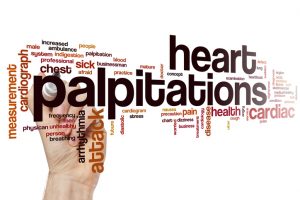 September 29, 2016 is World Heart Day, so we present our top articles on the matters of the heart and related topics, including gallstones, heart failure, Mediterranean diet, asthma, and stroke. World Heart Day was founded in 2000 to bring awareness about the impact of heart disease and stroke on the population. Being among the leading causes of death, these cardiovascular conditions claim 17.3 million lives each year.
September 29, 2016 is World Heart Day, so we present our top articles on the matters of the heart and related topics, including gallstones, heart failure, Mediterranean diet, asthma, and stroke. World Heart Day was founded in 2000 to bring awareness about the impact of heart disease and stroke on the population. Being among the leading causes of death, these cardiovascular conditions claim 17.3 million lives each year.
Oftentimes, many conditions affecting the heart are preventable, and all it takes is healthy heart habits and simple lifestyle changes.
Heart palpitations causes, symptoms, and treatments
Advertisement
In a healthy adult, the heart should average between 60 to 100 beats per minute. Factors that determine heart rate are activity level, exertion of the body, and even stress levels. Throughout the day, our heartbeats may quicken or slow down. This is known as heart palpitations.
Heart palpations can be harmless and merely a response to activity, stress, etc. But in some cases, heart palpitations can be the sign of a serious condition. When it comes to matters of the heart, it’s best to be on guard to help prevent any serious illness. Continue reading…
 Heart disease risk associated with gallstones
Heart disease risk associated with gallstones
There is a higher risk of heart disease in those who develop gallstones, according to new research findings. The study involving a quarter-million Americans found that there was a higher risk of future heart disease in those participants who had a history of gallstones. The risk was 17 percent higher, compared to persons who did not have a history of gallstones.
Gallstones and heart disease share many common risk factors, including obesity, type 2 diabetes, and unhealthy cholesterol levels. But the researchers are not convinced that shared risk factors are the explanation for the link.
Cardiologist Dr. Richard Stein suggests that gallstones alone may be a risk factor for heart disease. “Eat a heart-healthy diet, exercise, keep your blood pressure down. It would be prudent to get your other heart disease risk factors under control,” – he said. Continue reading…
 Heart failure after first heart attack may raise cancer risk: Study
Heart failure after first heart attack may raise cancer risk: Study
Heart failure after the first heart attack may raise the risk of cancer. Heart failure is a condition in which the heart becomes weakened as a result of damage and its functionality becomes limited. If the heart is unable to pump enough blood to other areas of the body, the risk of death, as well as the risk of heart disease, increases.
Cancer as a cause of death is usually separate from heart disease, but there is an association between the two. The researchers previously looked at the connection between cancer and heart disease and found a 70 percent greater risk of cancer in patients with heart disease.
The newer study looked at cancer risk in patients who developed heart failure after their first heart attack. Researchers compared patients with and without heart failure after heart attack, as they usually have a lot of health factors in common. Continue reading…
 Mediterranean diet may decrease heart disease risk by lowering post-meal blood triglyceride levels
Mediterranean diet may decrease heart disease risk by lowering post-meal blood triglyceride levels
Mediterranean diet may decrease heart disease risk by lowering post-meal blood triglyceride levels (PPL). High PPL is a known risk factor for cardiovascular events. The findings are supported by an extensive research review involving studies dating as far back as 1957 on the links between food and heart disease. The review results are published in The American Journal of Medicine.
The researchers found that elevated cholesterol levels are associated with a high intake of saturated fat, increasing the risk of coronary heart disease.
Advertisement
By now we know the importance of keeping the cholesterol levels down, and the American Heart Association recommends consuming less than 30 percent of daily calories from fat and less than 10 percent from saturated fat – commonly found in red meat and dairy. Continue reading…
 Later-life asthma increases the risk of heart disease and stroke
Later-life asthma increases the risk of heart disease and stroke
Adult development of asthma has been linked to pose risks to the heart. The latest findings looked at nearly 1,300 adults who did not have heart disease at the beginning of the study.
Of the participants, 111 were diagnosed with asthma as adults and 55 were diagnosed with asthma as kids. The participants were tracked for 14 years.
The researchers found among those who were diagnosed with asthma as adults they had a 57 percent higher risk of heart disease, stroke, heart failure, angina, or heart-related death compared to those who did not develop asthma or those who were diagnosed as children. Continue reading…
